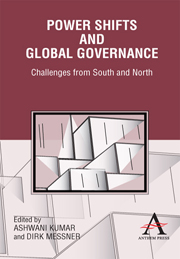Book contents
- Frontmatter
- Contents
- List of Contributors
- Foreword
- Power Shifts and Global Governance
- Part One Theoretical and Analytical Reflections on Global Governance
- Part Two Power Shifts, Regional Experiences and Global Challenges
- Part Three Case Studies in Global Governance
- 13 Unity in Diversity: South Coalitions as Governance Adaption Vehicles in Global Trade Governance
- 14 In the Foggy Middle East: Just Wars Remain the Name of the Game
- 15 Evaluation Capacity Development in the Arab Region: How Monitoring and Evaluation is Perceived and Applied?
- 16 UNEP Institutional Reform with its Impact on Developing Countries
- 17 The Heiligendamm Process and Emerging Powers: More of the Same or a Genuine Global Governance Innovation?
- Notes
14 - In the Foggy Middle East: Just Wars Remain the Name of the Game
from Part Three - Case Studies in Global Governance
Published online by Cambridge University Press: 05 March 2012
- Frontmatter
- Contents
- List of Contributors
- Foreword
- Power Shifts and Global Governance
- Part One Theoretical and Analytical Reflections on Global Governance
- Part Two Power Shifts, Regional Experiences and Global Challenges
- Part Three Case Studies in Global Governance
- 13 Unity in Diversity: South Coalitions as Governance Adaption Vehicles in Global Trade Governance
- 14 In the Foggy Middle East: Just Wars Remain the Name of the Game
- 15 Evaluation Capacity Development in the Arab Region: How Monitoring and Evaluation is Perceived and Applied?
- 16 UNEP Institutional Reform with its Impact on Developing Countries
- 17 The Heiligendamm Process and Emerging Powers: More of the Same or a Genuine Global Governance Innovation?
- Notes
Summary
Introduction
Throughout history, ‘wars of religion’ have served to obscure the economic and strategic interests behind the conquest and invasion of foreign lands. ‘Wars of religion’ were invariably fought to secure control over trading routes and natural resources. Islam has always remained in the eyes of the West as a totally strange culture. Similarly, the ‘war on terrorism’ purports to defend the American homeland and protect the ‘civilized world’. But, in fact, it attempts to secure control and corporate ownership over the region's extensive oil wealth, while also bringing it under the helm of the International Monetary Fund (IMF) and the World Bank (Michel Chossoudovsky 2007).
Arabs themselves have perpetuated the idea of unilateral cultural import. Such preserved original identity can only exist within an impermeable cultural environment that is cut off from foreign influences – an idea that still exits among Arabs today and can explain many of the phobias related to globalization. This complicated situation has caused two parallel wars to be going on in the Middle East.
One is the military conflict and the other is the media mobilization affair. While the media covers falling bombs and fleeing civilians and from time to time puts a human face on the agony of a war so far directed mostly at civilians, it rarely covers its own reporting with anything like a self-critical eye.
- Type
- Chapter
- Information
- Power Shifts and Global GovernanceChallenges from South and North, pp. 265 - 288Publisher: Anthem PressPrint publication year: 2010
- 1
- Cited by

